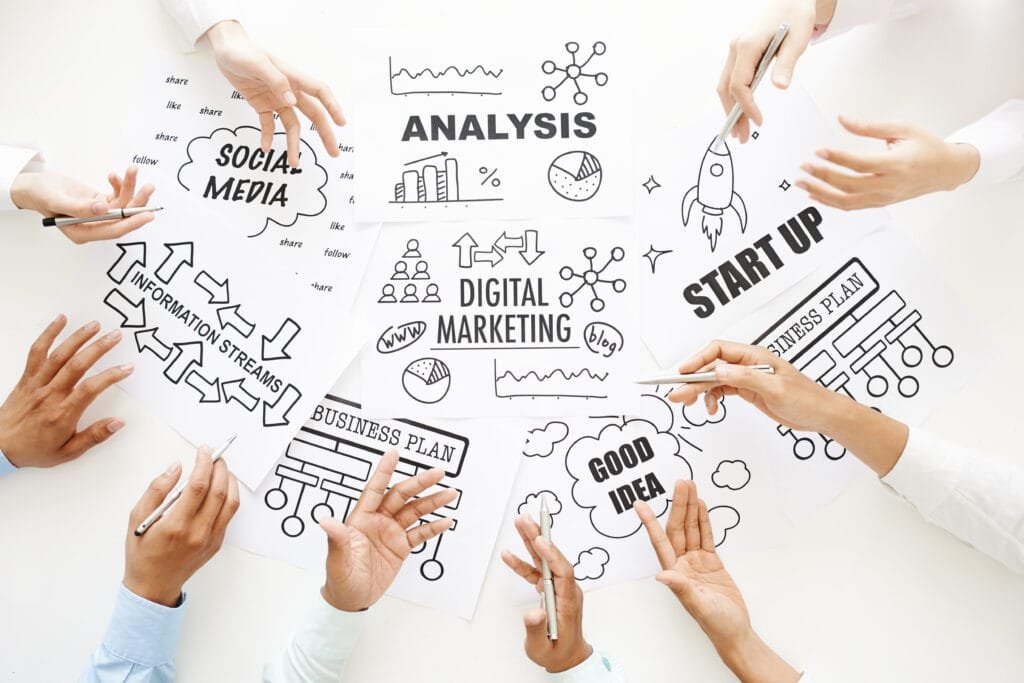Introduction
The digital era has completely transformed the way businesses interact with their customers. Gone are the days when traditional marketing channels alone were sufficient. Now, digital channels dominate the customer journey. From search engines and social media to email and mobile apps, there are endless opportunities to reach and engage your target customers.
But how can you navigate this vast landscape effectively?
The answer lies in leveraging the right digital marketing services — customize strategies that not only increase visibility but also drive conversions, build brand loyalty, and generate measurable ROI.
In this comprehensive blog by SparXcellence Ghodke’s LLP, we explore the full spectrum of digital marketing services, their importance, and how each can empower your business growth in 2025 and beyond.
1. Search Engine Optimization (SEO)
What is SEO?
SEO is the process of optimizing your website and content so that it appears higher in search engine results pages (SERPs) for relevant keywords.
Core Components of SEO:
- On-Page SEO: Title tags, H1, H2, H3, keyword placement, image optimization, and internal & external links.
- Off-Page SEO: Backlink creation & building, influencer outreach, guest blogging.
- Technical SEO: Mobile optimization, site speed, XML sitemaps, Indexing and structured data.
- Local SEO: Google Business Profile optimization (GMB), local citations, reviews.
Why It Matters:
- Drives organic traffic
- Builds brand authority
- Increases long-term ROI
2. Pay-Per-Click Advertising (PPC)
What is PPC?
PPC is a paid advertising model where businesses bid for ad placement on platforms like Google Ads, Meta Ads or Bing Ads. You pay only when someone clicks your ad for increasing brand awareness or more sales.
Examples of PPC Platforms:
- Google Ads (Search & Display)
- Bing Ads
- Facebook Ads
- YouTube Ads
- LinkedIn Ads
Benefits:
- Immediate results
- Highly targeted traffic (Country-wise, State-wise & City-wise)
- Budget control with measurable performance
3. Social Media Marketing (SMM)
What is SMM?
Social media marketing is the use of platforms like Facebook, Instagram, Twitter (X), and LinkedIn to promote your brand and engage your targeted audience.
Key Elements:
- Organic Content: Posts, reels, carousels, Interactions and live videos
- Paid Campaigns: Boosted posts, awareness ads, lead ads, carousel ads & sales ads
- Influencer Collaboration: Partnership with niche influencers to promote products or services.
Why Social Media?
- Builds brand awareness
- Creates meaningful connections & targeted customers
- Drives website traffic and conversions
4. Content Marketing
What is Content Marketing?
This strategy revolves around creating and distributing valuable content that attracts and retains a clearly defined audience — ultimately driving profitable action.
Popular Content Types:
- Blogs & Articles
- Infographics
- E-books & Case Studies
- Videos & Podcasts
- Webinars
- Creatives
Benefits:
- Improves SEO rankings
- Educates and nurtures leads
- Builds trust and authority in market

5. Email Marketing
What is Email Marketing?
Email marketing involves sending commercial messages directly to potential and current customers through email platforms like Mailchimp or HubSpot
Types of Email Campaigns:
- Welcome emails
- Newsletters
- Abandoned cart reminders
- Product promotions
- Drip email sequences
Advantages:
- High ROI (up to $42 for every $1 spent)
- Direct, personalized communication
- Great for customer retention
6. Affiliate Marketing
What is Affiliate Marketing?
This performance-based model rewards third parties (affiliates) for promoting your services or products and driving conversions/sales.
How It Works:
- Affiliates use special links to direct traffic.
- You track clicks/sales and pay commissions accordingly.
Pros:
- Low risk, performance-driven
- Scalable channel for growth
- Expands your reach
7. Influencer Marketing
What is Influencer Marketing?
It’s a strategy that involves working with social media influencers or content creators to promote your brand to their followers.
Types of Influencers:
- Mega influencers (celebrities)
- Macro influencers (100K–1M followers)
- Micro influencers (10K–100K followers)
- Nano influencers (<10K followers)
Why It Works:
- Boosts brand credibility
- Connects with niche audiences
- Encourages authentic promotion
8. Video Marketing
What is Video Marketing?
Video marketing uses multi-content to educate, entertain, and convert your audience. It’s among the most effective content types in the digital space today.
Formats That Work:
- Explainer videos
- How-to guides
- Product demos
- Behind-the-scenes content
- Testimonials
Benefits:
- Higher engagement rates
- Enhanced SEO
- Improved conversion rates
9. Online Reputation Management (ORM)
What is ORM?
ORM focuses on influencing how people perceive your brand online, by monitoring and managing reviews, ratings, and public comments.
Services Offered:
- Review response management
- Brand monitoring tools
- Crisis response strategies
Value to Your Business:
- Enhances brand trust
- Controls public perception
- Improves customer retention
10. Conversion Rate Optimization (CRO)
What is CRO?
CRO involves analysing and improving your website or landing pages to increase the percentage of users who take a desired action.
CRO Techniques:
- A/B testing
- Heatmaps and analytics
- Improved UX/UI design
- Compelling CTAs
- Page Speed
Why It’s Crucial:
- Increases revenue without increasing traffic
- Enhances user experience
- Maximizes every marketing dollar
11. Mobile Marketing
What is Mobile Marketing?
Mobile marketing is the multi-channel digital strategy aimed at reaching your audience on their smartphones or tablets.
Channels Include:
- SMS marketing
- Mobile-optimized websites
- App-based marketing
- Push notifications
Benefits:
- Higher open and response rates
- Real-time communication
- Stronger customer relationships
12. Marketing Automation
What is Marketing Automation?
This involves using software to automate repetitive marketing tasks like emails, social media posting, and ad campaigns.
Tools Often Used:
- HubSpot
- Active Campaign
- Mailchimp
- Salesforce Marketing Cloud
Business Impact:
- Saves time and effort
- Ensures consistent messaging
- Streamlines lead nurturing
Choosing the Right Digital Marketing Services
With so many options available, it can be overwhelming to decide which services are best for your business/brands. The right strategy depends on your:
- Business goals (brand awareness, lead generation, sales, etc.)
- Target audience/customers
- Budget
- Industry and competition
At SparXcellence Ghodke’s LLP, we offer personalized digital marketing services solutions that align with your business objectives. Whether you’re a startup or an established brand, we help you cut through the noise and drive real results.
📢 Ready to Take Your Brand to the Next Level?
Don’t leave your digital growth to chance. Partner with SparXcellence Ghodke’s LLP and discover how tailored digital marketing services can transform your business.
✅ Contact us today for a free consultation!
🌐 Website: www.ghodkes.com
📧 Email: care@ghodkes.com
Conclusion
Digital marketing services is no longer optional—it’s essential. Whether it’s ranking on Google, connecting on Instagram, nurturing leads via email, or driving conversions with paid ads, the right combination of digital marketing services can take your business to new heights.
By understanding each service and how it supports your broader marketing goals, you’re better equipped to build a strategy that delivers both short-term wins and long-term success.
Ready to grow? Let SparXcellence Ghodke’s LLP help you craft a winning digital strategy.

















